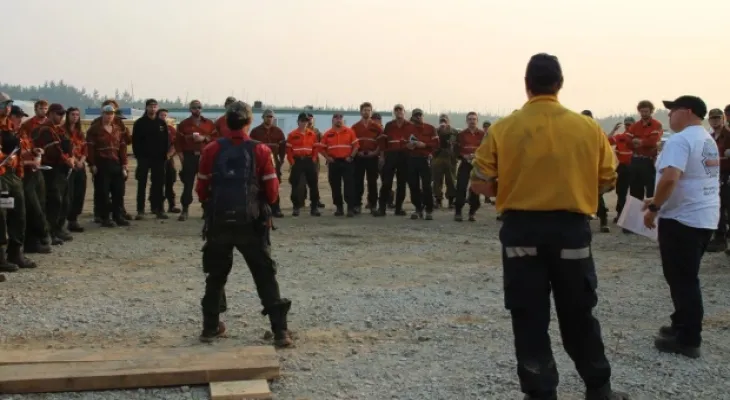Search here
Newspaper
Search here

Arab Canada News
News

Published: July 23, 2024
Multiple wildfires erupted in Jasper National Park late on Monday night, forcing all park visitors as well as the 4,700 residents of Jasper townsite to flee westward without much notice through mountainous roads during the dark, soot, and ash.
Images and videos shared on social media illuminated a procession of cars and trucks at midnight, headlights on, red taillights glowing, cars moving slowly, stopping, starting, and crawling through a swirl of acrid smoke.
Caroline Campbell, a resident of Edmonton, said during a phone interview from her car, "It's complete gridlock," and the smoke is very thick, so we have masks in the car."
Campbell added that it took hours to move just seven kilometers. She said they have enough gas, but she's worried about others who fled and have little in their tanks.
The Jasper townsite – and Highway 16, which is the main artery running east-west through the park – was effectively pinned by a fire pinch, as fires threatening from the northeast cut off the highway eastbound toward Edmonton.
Another fire that erupted from the south also closed the Icefields Parkway between north and south.
This left one route open - west to British Columbia.
Park and town officials rushed to alleviate traffic congestion, fuel vehicles, and assist vulnerable individuals in reaching safety while also marshaling resources to fight the fires.
The Alberta government issued an emergency alert just after ten p.m.: “Everyone in Jasper must evacuate now.”
The federal agency added in its statement: “Parks Canada is responding to multiple wildfires. This is a developing and dynamic situation.”
Those who were evacuated were told they had five hours to leave – by 3 a.m. local time Tuesday – and to take with them essential documents, pets, medications, and any other emergency supplies.
Those without transportation were asked to go to the Jasper Activity Centre or Forest Park Hotel or Maligne Lodge.
In British Columbia, the province was quick to find places for accommodation.
BC's Minister of Emergency Management, Bowinn Ma, said in a post on social media X: “We will do everything we can to provide safe shelter for people evacuated from Jasper, and we are working as quickly as possible to coordinate routes and arrange for host communities on our side of the border.”
The village of Valemount, located on the border between British Columbia and Alberta, opened its community hall to accommodate evacuees, with limited overnight space.
Anne Yancio, the village's CEO, said in an interview: "We are able to give them some water, and perhaps some snacks."
"For those who have been evacuated from their homes, we can offer them vouchers for accommodation and meal vouchers."
Yancio added that there was no immediate need to direct evacuees to move west to Prince George – a larger center with more facilities to handle evacuees.
She continued, "They (the evacuees) are already tired, and it's midnight, and a three-hour drive to Prince George could mean just accidents happening. We are telling them that (Prince George) is their final destination, but not tonight."
Back in Alberta, travel west of Hinton, which is directly east of the national park, has not been advised.
The Royal Canadian Mounted Police (RCMP) stated in a press release: “Please avoid the Jasper National Park area along Highway 16 and allow first responders to do their work safely.”
Parks Canada stated that evacuations have been carried out in several campgrounds, in addition to the Athabasca Hostel and the Palisades Centre for Supervising and Education.
Jasper National Park is the largest national park in the Canadian Rockies, home to campgrounds and extensive trail networks.
The Jasper fires were among several wildfires across Alberta that have already displaced another 7,500 people in a series of remote communities.
The province has suffered from extreme heat for several days, reaching up to 30 degrees Celsius.
More than 160 wildfires are burning across Alberta, resulting in plumes of smoke and obscuring the sky.
Comments